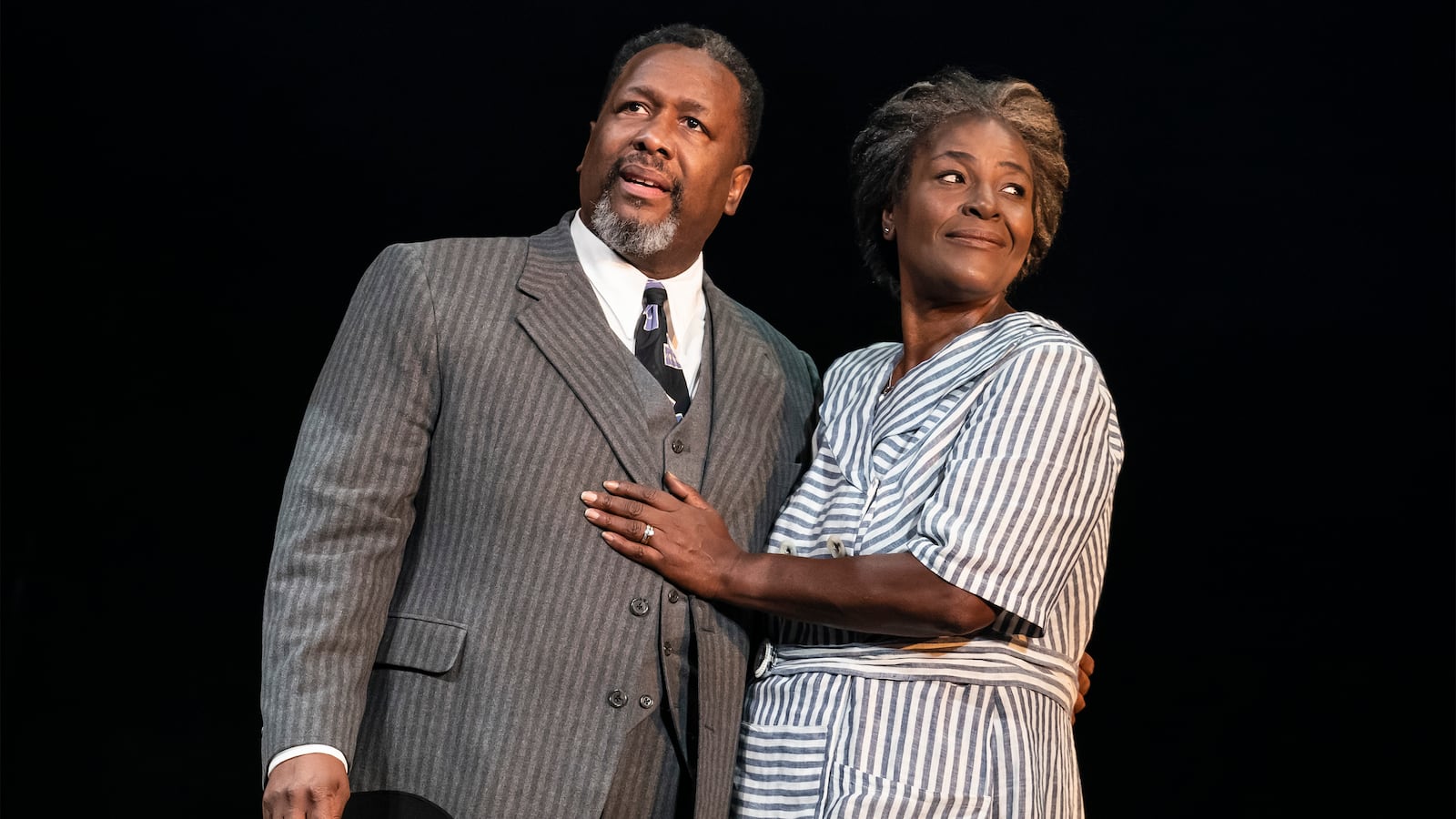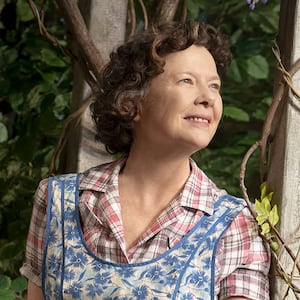Willy Loman should be the focus of Death of a Salesman. It is his flailing death spiral that forms the narrative heart of Arthur Miller’s legendary play. But in the latest Broadway revival, starring The Wire and Treme star Wendell Pierce as Willy, which opens tonight (Hudson Theatre, through January 15, 2023)—with the Lomans played by an all-Black lead cast—the production’s anchor is Willy’s wife Linda, played by the simply stupendous Sharon D Clarke.
Clarke, Tony-nominated this year for Caroline, or Change, gives an intensely moving, beautifully executed performance. The play remains set in the Brooklyn and New York of 1949, and Boston many years before, and while not a word of the play has changed we now see its desperation—of what a family struggling to aspire and succeed, and also trying desperately to stave off failure and disaster—can also be viewed through the prism of race and racism, unseen and unspoken forces accentuating every positive the family grasps for and every negative that may sink them.
The production is directed by Miranda Cromwell, who won an Olivier Award alongside co-director Marianne Elliott for the West End and Young Vic productions, where this Broadway production originated. (Pierce and Clarke are reprising their London roles; he was Oliver Award-nominated; she won the Olivier and a Critics’ Circle award.)
The play has been “revived for a demographic of the culture who has yet to experience the accessibility of the American dream, which is at the core of the play. That’s why the Loman family is Black,” André De Shields, who plays the ghostly figure of Willy’s brother Ben with his trademark shimmy and swagger, said in a recent interview. Bounding the play at beginning and end is a softly intoned gospel song promising a kind of recovery and relief: I will make my way / Toward that river to home / Till we meet again / When the trumpet sounds.
Just as Ben appears from the side of the stage, wreathed in wisps of dry ice, chiding and goading his brother into reaching for the same financial riches he attained, so the show has the air of a ghost story, a tale placed in fragmented snatches of time and reality that Miller writes in the play.
Anna Fleischle’s set is only partly domestic. It is a kind-of-house in formation and deconstruction, set around a series of platforms. There is a kind-of-kitchen in front of us (table, some chairs), and a kind-of-bedroom (two lights, platform). Tables and chairs hang suspended from the theater ceiling; door and window frames appear and disappear.
The precariousness of Willy’s life is immediately apparent through such design and directorial decisions, as is his lack of control not only over his material and personal circumstances but also the madness-accelerating voices in his head. However, these symbolic hammer notes are overdone—They are too literal, they clutter and confuse, as do the actors striking dramatic frozen poses (with added bolts of light), as if in a movement class, to convey shifts in time.
Pierce’s performance from the outset is full-throttle; this Willy Loman is already over the edge when we meet him—feuding with his favored son Biff (Khris Davis), and barely able to acknowledge the other one, the rootless, sex-focused, and supremely ironically named Happy (McKinley Belcher III). Willy is forever manic—a gale of conflicting smiles, folksiness, booming anger, tenderness, and rudeness around his wife, children, boss, neighbor, and ghostly tormentors. He is the good husband who snarls, a folky, regular guy in freefall, a pillar all too ready to crumble—and what is apparent to everyone else also seems apparent to him from the start.
Willy is a human pinball, and so are his sons, with Davis furious at his father’s betrayal, and whose liberation—which could in fact be the whole family’s liberation—is to say no to the mantle of misplaced expectation that Willy has placed upon him. Biff is not a mythical football hero, now in a blue suit ready to conquer New York; Biff comes to know himself, with relief, as a dud, but a dud who, if released from the burden of his father’s fervent, fantastical belief in him, may just find himself.
But the Lomans don’t want this truth; just as the floating scene décor and nervy tableaux underline, this is a family in thrall to self-generated deceptions around Willy’s brilliance. They must keep the lie present to keep their flawed emperor on his shaky throne, even though Linda, Happy, and most especially Biff know the emperor has no clothes. Most urgently, Linda knows her husband’s ego and status must continue to be built on illusion and fantasy to keep him alive.
Besides Linda, Willy’s most emphatic defender is his neighbor Charley (Delaney Williams), a seeming schmuck who actually sees Willy for who he is and who genuinely wants to do all he can for him; we see both a stab of pride and pain grip Willy when he sees Bernard (Stephen Stocking), Charley’s son, heading off to begin a life on the highway to the conventional success, riches, and respectability Willy knows that Biff will likely never embark on and that has also eluded him.
This scene, as with Willy’s other piercing scenes—begging his awful boss Howard (a sharply cruel Blake DeLong) for his job, or dancing with Linda in their kitchen in a sweet moment of domestic intimacy, or when Biff as a teenage boy discovers his secret adultery—make him slow down. It is here we visibly see his hopes and possibilities variously bloom and narrow.
Howard makes Willy pick up his lighter, and light his cigarette. He makes him beg, and then sneers at him for begging. He ensures that Willy loses one of his last shreds of dignity, then tells him to pull himself together. He recoils at Willy’s touch, he looks at him as if he is nothing—this scene’s ugliness is accentuated by Howard’s whiteness, and the extra peril of Willy Loman, as a Black man in 1949 with already flailing mental health, finding a new job of equivalent status.
Throughout the show, and amid all the relentless and exhausting male shouting around her, Clarke charts a nuanced yet still tension-filled course for Linda, and does it with such astute calibrations of mood and moment that her journey feels most revelatory. She will do anything to support her husband, and her fierceness translates most furiously to a condemnation of her thoughtless sons. Just as she did in Caroline, or Change, Clarke shows what an expert navigator and interpreter of text she is, and in doing so shepherds an audience along with her. We understand Linda, we feel Linda, with real clarity and depth because of Clarke.
Clarke locates in Linda Loman a supportive wife who, in hiding the instrument of her husband’s suicide, is also engaged in a desperate, private mission of salvation which she knows is futile. When we see Willy desperately planting seeds on the barren ground of his garden, we think of King Lear, reduced and shrunken and mad on the blasted heath. It is heart-rending more than pathetic.
Miller’s play is so repetitive, with so many deferred revelations of secrets, so many confrontations unrealized, and so many words left unsaid, that the final family confrontation, where everything quite literally is laid out on the table, is a relief of many kinds—not least because the audience has been helplessly watching the Loman pot of family strife boil for over three hours. When Biff, in Davis’ finest-played scene, tearfully and eloquently begs to be set free from his father, you wish that Willy, Happy, and Linda would hear what he is saying—and not only save him but also save themselves.
But Biff, of course, is misheard and misunderstood by his father, and the final seal of the tragedy of the play barrels horribly into view. The last words and crystalline-sung notes in the play’s “requiem” belong to Clarke, who, as the production’s supremely assured pilot, delivers both production and audience to the play’s properly profound end. For all the male sound and fury, this Death of a Salesman feels really, and rightly, all about her.







